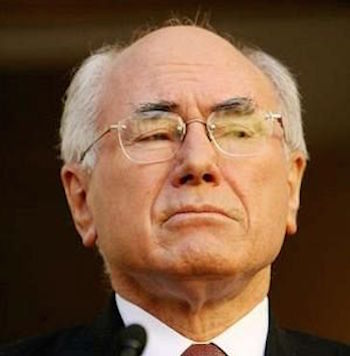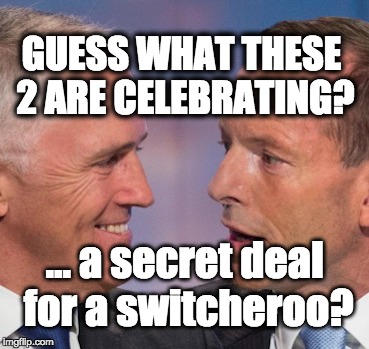IN AN EXCLUSIVE INTERVIEW, Julian Assange said that if Victorians vote him into the Senate this Saturday, thanks to proposed changes in the U.K.’s extradition laws, we may actually see the fighter for justice, transparency and independent media take his place on the red leather benches come July 2014.
This new disclosure from the man holed up in the Ecuadorian Embassy stems from the planned scrapping of the U.K.’s extradition treaty in relation to the European Arrest Warrant (EAW). The modifications, due to come into effect in between January and June 2014, will prevent the use of extradition for purposes other than prosecution. Remember, Julian Assange has not been formally charged with any offence. The EAW was simply for questioning.
Under the proposed new rules, according to Assange, Swedish prosecutors would have to interview him on UK soil, not in Sweden. There being no case to answer, as he insists, he would be free to leave the U.K.
“If I’m lucky enough to be elected, I’m not due to take my seat until July 2014. The Constitution gives me at least two months’ grace after that. So the timing may all come together,” he said.
Assange attributes his High Court case and Supreme Court appeal against for the government’s adoption of the changes to the European Arrest Warrant (EAW) recommended by the Scott Baker Extradition Review. In July 2012, the lobby group, Fair Trials International, reported:
'The direction follows Lord Phillips’ explicit call for the introduction of a proportionality test in our extradition laws in last month’s [June 2012] Assange ruling. It is a strong indication that, pending legislative reform, the courts may themselves start to weed out the most disproportionate cases.'The Review, published in October 2011, recommended extradition for minor crimes cease. The European Commission backs the changes, arguing the use of EAWs for minor offences had undermined confidence in the system. Whilst there is no indication as yet whether the changes will apply to old cases like Assange’s, the government responded in October last year:
'The Government will take the opportunity of the 2014 JHA opt-out decision to work with the European Commission, and with other Member States, to reform the European Arrest Warrant so that it provides the protections that our citizens demand.'
Of more immediate importance, with the Federal election being held tomorrow, people want to know, if Julian Assange, or his fellow Victorian Senate candidate Binoy Kampmark, is elected to the Senate, would the WikiLeaks Party bow to Tony Abbott’s wishes to repeal the carbon tax?
Julian Assange:
“If Tony Abbott has a mandate to change the carbon tax, then we will consider that mandate strongly. However, it is not enough to abandon the carbon solution or to create what appears to be a giant multimillion-dollar carbon slush fund. We would be guided by the people but it cannot simply be an unaccountable slush fund nor a scrappy policy without something to replace it.”A centerpiece of the party’s campaign is its call for a shake up in media policy — a hot topic on IA’s comments threads and the Twitterati. At a New News panel discussion during the recent Melbourne Writers Festival, journalist Gay Alcorn declared the Murdoch press “the worst case of news reporting and the biggest story this election."
"The Daily Telegraph and Courier Mail bias is deliberately orchestrated,” she said.
IA asked about improving access and quality of information to Australians:
“You’ve said we live in a “mediocracy” and that you’d push for a radical change in media policy such as the introduction of tax deductibility for not-for-profit media.”Assange:
“Our knowledge sharing system ‒ the media, the ways in which individuals engage with each other through the Internet ‒ is an important element in Australian political and civil life. Every constitution, every moment of scrutiny and accountability comes about as a result of people sharing information about how the world actually works.”
According to the WikiLeaks Party leader, Australian media is in “parlous state” where seven out of ten national newspapers are owned by just one corporation, News Ltd.
“Australia has 98% print media in hands of just three large corporation. Working to balance this are the other new media groups — independents like Crikey, New Matilda, Independent Australia, WikiLeaks and overseas publications.The U.S. has seen an explosion of high quality, not-for-profit media organisations such as the award winning multi-media site, Democracy Now, with Amy Goodman and Pro Publica. Funded entirely through contributions from listeners, viewers and foundations with no advertisers, corporate underwriting or government funding they are truly independent.
“The existing media companies don’t want to see increased competition in Australia, but we have a policy to introduce tax deductibility for independent not-for-profit organisations similar to legislation introduced in the United States.”
Independent news sites like Independent Australia and New Matilda have lobbied for such a tax scheme, where donations to genuine not for profit publications become tax deductible for donors — like charities. But, according to Bill Birnbauer from the Public Interest Journalism Foundation, its submission to the Finkelstein Inquiry was put in the too hard basket.
Mr Birnbauer is concerned about the lack of diversity, which he felt should be a key issue in Australia, as it is in the U.S:
“Philanthropic organisations in the U.S. recognize that investigative, independent journalism is integral to democracy and that mainstream media can’t fulfill that Fourth Estate role.”The issue of truly independent media in Australia raises the question of protections for whistleblowers and shield laws. In the United States, most of the states have shield laws. But not in Australia. Julian Assange declared the situation in Australia both practically and legally as one of the worst in the world.
“Australian protection for the rights of sources is non-existent. There are a number of ongoing actions right now to force journalist to reveal their sources. The Age amongst them.The WikiLeaks Party has nailed its colours to the mast. “Transparency, Accountability and Justice” is not just a Mum and apple pie slogan — it’s the way it intends to operate in the Senate, according to Assange.
“Interestingly, when the WikiLeaks Party put a list of issues on line for members to vote on in order of priority, protection for whistleblowers and shield laws was the top vote-getter."
When asked about his vow to “keep the bastards honest”, Assange was quick to add a correction:
“You’re assuming they’re honest to begin with. We say: ‘making the bastards honest’.”With distrust of politicians and apathy about transparency at an all time low on the heels of the outcry over the Victorian state government’s refusal to disclose its East-West Link business case, IA asked what distinguishes the WikiLeaks Party from the former Australian Democrats.
Would we see Assange’s alter ego, the big guns of the whistleblower website rolled in to expose corruption?
Assange:
“That’s the idea. The Democrats had a few good years when Don Chipp was at the helm. Ultimately what makes us different is that all our Senate candidates are journalists, human rights lawyers or international scholars and campaigners for justice.”
He continued:
“So, if Australians are good enough to elect me or others to the Senate, we’re not going in empty handed. We’re going in with a very powerful alliance and network of investigative journalists and researchers who are excellent in understanding government corruption, understanding public and private deals and political machinations, and how to deal with intense pressure.”We asked him whether all his people were as fearless as him.
He said they were.
“They’ve all shown themselves to be fearless. You can see that by the long-term work they’ve been engaged in, fighting for the rights of the public. None of them has been tempted by money or political influence. They’ve all put justice and truth before other interests in their lives.”This brings the WikiLeaks founder to the question of policy versus personality. He disagrees with the intellectual left’s focus on policy:
“Better to look at long term interests of the individuals who entering into parliament. Because that’s a much better guide to their behavior in the next electoral cycle.”In the event WikiLeaks snares several Senate seats, would members vote in a bloc or could they exercise their own conscience?
“That’s quite an interesting question. There’s a naïve view that every vote should be a conscience vote. I disagree with that. Reason being is this: when Australians vote for a party as opposed to a single Senate candidate, they’re voting for the reputation of that party. In the case of WikiLeaks, they’re voting for a party. We need to behave in a way we promised to behave, keeping check on government corruption, etc. Otherwise, it would be a breach of our promise to the public. So, those areas where we’ve made an important promise, strict party discipline would apply.”
In a recent two-part report on the cartelization of Australia’s political parties explored by this writer, some academics and commentators felt our politicians no longer represented our interests but are held captive by powerful factions, unions, lobbyists and vested interests — in some cases powerful foreign interests such as the United States. IA asked whether Mr Assange thought our two major parties had simply become political cartels.
"Yes, that’s quite correct. Cartelization is a very good word for it!”Our discussion turned to the internal ructions in the fledgling party. Like the Greens, WikiLeaks is powered from the bottom up. As a new party, its first directors were to hold office only until the AGM following the federal election. At this time, the party members will nominate and elect the new National Council.
Assange emphasized that the Council is not an executive body but a policy-making body.
“The internal tensions were all quite predictable. Since July, our rapid growth saw over 2,000 members joining. All have different views about the party’s trajectory on what they think is important as well as their personal relationships. Some think the party should be a vehicle for themselves or something broader. Those complexities are inevitable. It would be impossible to imagine a new party without teething problems.IA asked how confident Mr Assange was of being elected.
“I’m pleased we had only one significant resignation with Leslie Cannold but I’d have liked to have known about her issues beforehand. She didn’t discuss them with me at any stage or via third parties. But I understand she has a particular base associated with previous political positions. And I understand that she obviously felt it wasn’t in her own interest to continue.”
“We only started in July. According to the last opinion poll, we are the fourth most popular party in Australia — and the most popular of all the new parties. But nonetheless, in this election it will come down to the primary votes and preference flows from other parties. Gerry Georgatos may have a chance In WA, same with Kellie Tranter and me/Binoy Kampmark in Victoria.Julian Assange’s bid to keep Australia’s “political bastards” honest is arguably a logical segue from holding “global “bastards” to account and a return to his geopolitical roots. If successful, where better to shine some light than from Australia’s House of Review?
“It’s quite hard to predict how it’s going to go in Victoria. It would help us to get primary votes. But for those not voting WikiLeaks Party, according to the most recent polling, the Greens will get well over their quota of 14 per cent. Those preferences above 14 per cent will potentially flow to us. So, if Greens do unusually well and some of the other minor parties who preferenced us do well, we need only 4 per cent to get elected in Victoria.”
This work is licensed under a Creative Commons Attribution-NonCommercial-NoDerivs 3.0 Australia License









